#slavic languages
Text
Please, when you see something written in Cyrillic, don't assume right away that it's russian. Russian is not the only language that uses Cyrillic. There are also Ukrainian, Belarusian, Bulgarian, Macedonian, Montenegrin, Serbian, Kazakh, Kyrgyz, Tajik, Mongolian.
It's a sensitive topic especially for us Ukrainians because russian language is a weapon. It's a colonial language, it's presented like one and only true slavic language, it erases and replaces other languages. Belarusian is literally on the verge of extinction because of russian. Ukrainian has been banned 134 times throughout history, it is still called a "village language", a dialect of russian. Russian colonialism is literally the reason why there are so many russian speaking people in Ukraine (I was one of them btw). Ukrainian is banned on russian occupied territories and people are getting in trouble or even killed for using it there, Ukrainian POWs in russian captivity are getting brutally beaten for speaking Ukrainian.
Like okay, I can get why there's this confusion, so here's a clue to understand that the language you're looking at definitely is not russian — the letter і. If you see ї (like i but with two dots) it's 100% Ukrainian. If you see j it's Serbian. Russian alphabet also doesn't have such letters as Ђ, Љ, Њ, Ў, Џ (dont confuse with Ц ). Yes, it's not always gonna be easy to detect that the language in front of you is not russian, but when you have trouble with it just ask or run it through any translation app and it'll probably tell you the language.
Hope this will be helpful.
#cyrillic#russian colonialism#ukrainian language#slavic languages#turkic languages#russian language#russian invasion of ukraine
4K notes
·
View notes
Photo
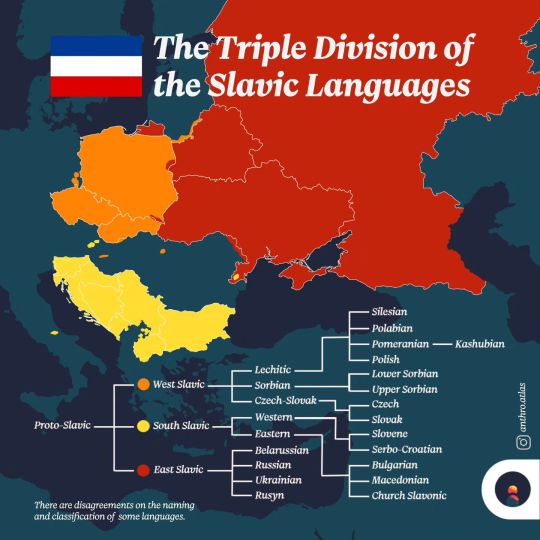
The triple division of the Slavic languages
by anthro.atlas
The Slavic languages, one of the major subfamilies of the Indo-European languages, are usually divided into three branches: East (e.g., Russian and Belarussian), South (e.g., Serbo-Croatian and Bulgarian), and West (e.g., Polish and Slovak). Some scholars contend, however, that this division is mostly based on extralinguistic factors, such as the speakers’ divergent ideological and religious views. For instance, some argue that some languages and dialects are misclassified due to political factors (e.g., Rusyn and Silesian) and that there are only two main branches, the South and the North (which includes the East and West Slavic languages). Sources: Ethnologue (2023) & Tomasz Kamusella’s paper, “The Triple Division of the Slavic Languages” (2005)
204 notes
·
View notes
Text
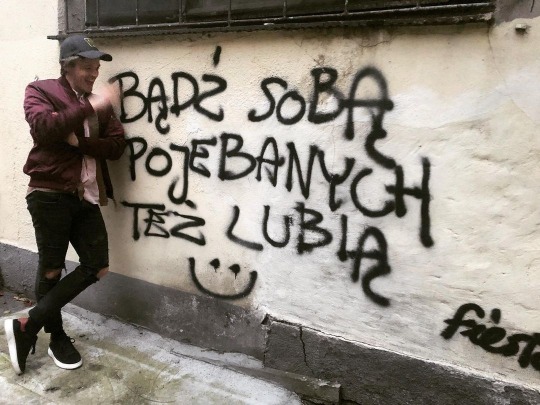
:)
#po polsku#tekst po polsku#polska#poland#polish#polski blog#polski tumblr#przemyślenia#śmieszne#zabawne#język polski#polishcore#polblr#polish wave#polandcore#slavic languages#slavcore#positive quotes#piotr gawron jedlikowski#positive thoughts
180 notes
·
View notes
Text
Free online courses about Ukraine
Basics of the Ukrainian Language and Culture - https://www.open.edu/openlearn/languages/introduction-ukrainian-language-and-culture/
Ukraine: History, Culture, and Identities; this course is available in English, French, Italian, and Norwegian on Coursera: https://ui.org.ua/en/sectors-en/the-first-online-course-about-ukraine-in-english/
The Making of Modern Ukraine with Timothy Snyder: https://www.coursera.org/learn/the-making-of-modern-ukraine
Crimea: History and People on Udemy: https://www.udemy.com/course/crimea-history-and-people/

#ukrainian language#ukrainian#ukrainian101#ukrainian lesson#learning languages#language learning#ua lang#ukraine#langblr#slavic languages#learnsomethingneweveryday#learning#self studying#polyglot#Language blog#foreign languages#learnukrainian#learn ukrainian#free resources for language learners#free courses#language courses#slavic language courses#eastern european languages#eastern european#Ukraine
272 notes
·
View notes
Text
Najlěpša čast postovanja na medžuslovjanskom jest že jego ne znaje google translate. Zato ne možut zapadniki/amerikanci dati prěvoditi posty i potom iměti o njih durne hot takes
343 notes
·
View notes
Text
Correcting all the atrocities against Russian language in Grishaverse
I think that I might’ve already wrote on this topic here before, but I can’t seem to find it and I’m continuously bitter with the way my language has been expropriated and twisted in the girishaverse series, so, without further ado, 10 things that infuriated me (and the ones I remembered now, for there are surely more) as a Russian speaking person:
1. The first being the Grisha itself. It’s a male name. A shortened version of the name Grigoriy, to be exact. To call an entire group of people like that is… try switching it to “Johnny” every time you read it and you’ll understand the pain. She could’ve at least try and justify it with some “first ever” character with such powers named Grigoriy, so that’s why they’re called that… but no
2. All the names. Listen, if you’re using Russian names while writing in English (or any other language that doesn’t differentiate between genders) you have two ways:
eradicate the switch completely, giving everyone the male version (i.e. default bcs that’s the world we live in), or
FUCKING STICK TO THE RULES OF THE LANGUAGE YOU’RE GOT THEM FROM. The female Russian last names will always have a vowel in the end. So, it’s Aleksander Morozov and Baghra Morozova (I’m dying to know what name she thought that one is a short version of, for it just doesn’t exist). It’s Alina Starkova. Genya Safina (which should be Evgeniya, bcs Genya is a short version). Zoya Nazelenskaya (her name looks to me as of Polish and/or Ukrainian origins, correct me of I’m wrong. I’m only going off from the Russian language rules), etc.
3. It’s Fyodor, not Fedyor. And it’s Kaminskyi or Kaminskyy, there is an extra sound in the end, not just -y. Actually, for this last name use the name of the President of Ukraine as a guide, their names would be of the same origin, same as Zoya’s last name.
4. You cannot use just any word as a name in Russian language. I know that it’s sort of a thing in modern English language, but it’s not a case here. So, if I recall, there was a character with the name “Privyet” in the books. Which means “hi” in Russian. Don’t do things like that. Please. I beg of you. Fun fact, we have Vera, Nadezhda and Lubov (Faith, Hope and Love respectively) as real FEMALE ONLY names, but no such thing as just taking a word like say “Otvaga - Bravery” and making it a name. Nope.
5. Don’t even get me started on the idiocy that “otkazat’sya” is. It’s. A. Fucking. Verb. Means “to refuse” in a slightly different context that “otkazat’”. There isn’t a single version of the reality where it would’ve made sense to call a group of people by verb. None. If she wanted it to mean “the abandoned” as in “the power abandoned them”, she should’ve called them “otvergnutyye” or “ostavlennyye”. If the meaning is more towards “they refused that power”, then it should be smth like “otkazavshiesya”.
6. They have stressed the wrong syllable in the “merzost’” on the show. Supposed to be the first one. Not sure whether or not she meant to use the word “filth” in regards to the forbidden magic, or if, once again, she just liked the sound of this word.
7. “Kefta” should’ve just been “kaftan”
8. I actually hate that she couldn’t just stick to the names that would’ve been found in Russian empire during the time she drew inspiration from. What is Baghra and Malyen???? Where’d she get them??? I can stretch Baghra as being a very strange short version of the name Agrafena (veeeeery old Russian name, which suits her long life), but it’s a big stretch to say the least. Malyen just doesn’t exist. Mal doesn’t exist as a name (it’s a old version of the word “small” though)
9. What is the word “Tsarina” everyone seems to use in fanfiction where Alina and Aleksander rule over Ravka? There is no such word. There are:
Tsar - the male ruler
Tsaritsa - female ruler and/or wife of a Tsar
Tsarevich - son of Tsar and Tsaritsa
Tsarevna - daughter of Tsar and Tsaritsa
No Tsarina.
10. David’s last name is extremely strange. I assume he’s not of Ravkan origins, from his first name, but Kostyk - is a friendly short version of a name Konstantin. I’m debated over the fact whether or not this form of this name has even been in use before Soviet Union actually. I’ve met people with the last name like Kostyukevich and Konstantinov though (there are many last names that originated from first names in Russian language many, many years ago. But there are rules for the ways they were formed)
Feel free to add all the ways Leigh Bardugo butchered other languages and cultures in this series
#grishaverse#russian language#slavic languages#shadow and bone#aleksander morozov#alina starkova#genya safina#baghra morozova#malyen oretsev#shadow and bone season 2#shadow and bone series#incorrect shadow and bone
126 notes
·
View notes
Text
I love knowing a Slavic language, because it means that I can understand random bits and pieces from other Slavic languages, or even gather the general idea of a sentence. I remember watching some Czech woman talk about how she did something every week. I haven’t a clue what she did every week, but I knew that she did it every week!
11 notes
·
View notes
Text
the word "hlad": *exists*
me: what on earth could this mean
dictionary: it means "hunger"
me: ohh right, czech doesnt have "g" (-> h) and also remember liquid metathesis haha so it makes sense that Proto Slavic *goldъ evolved into Russian голод gólod and Czech hlad! :D
2 hours later
the word "hlas": *exists*
me: what on earth could this m-
#. SCREAMING#. once i memorise all the sound laws it's gonna be so over for you guys#. (addressing the slavic languages)#. this is so funny to me. you will never guess what hlas is in russian.#. it's голос gólos. that's right. from proto slavic golsъ#. and with this i wish you a good night <3#učím se česky#langblr#lingblr#proto slavic#czech#russian#slavic languages#l#r.txt
17 notes
·
View notes
Text
Many Poles would frown upon the idea of creating a cyrillic orthography for Polish, as they would associate it with the time of partitions of Poland when the tsarist regime tried to erase our language and national identity. I think, however, that there is nothing to worry about; an orthography faithfully representing historical origins of Polish phonology and alternations would cause any russian trying to read it to suffer a stroke.
58 notes
·
View notes
Photo
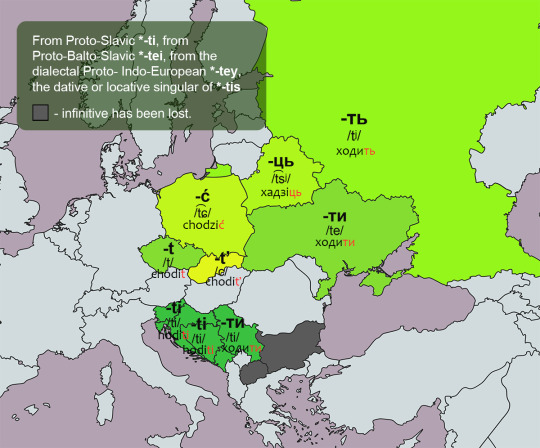
Realizations of Proto-Slavic *-tiin descendant languages
90 notes
·
View notes
Text
youtube
This episode of Ukraine's True History from the Kyiv Independent deals with Russian attempts to suppress the Ukrainian language, and culture in general, for over 300 years.
Russia has been trying to wipe out Ukrainian identity for over 300 years. There is little difference between the tsars, the communists, and Putin. All have been imperialists with the aim of Russian domination.
There are some people, mostly Putinistas and ignoramuses, who claim that Russian and Ukrainian are the same language. For now I will hold off on a linguistic explanation of how they aren't. But if they weren't really different, why would Russia spend three centuries trying to wipe out Ukrainian?
#invasion of ukraine#linguicide#genocide#ukrainian#slavic languages#suppression of the ukrainian language by russia#ukraine's true history#kyiv independent#ukrainian history#the tsars#the soviet union#vladimir putin#the putin régime#русский мiръ#россия - террористическая страна#владимир путин#путин хуйло#военные преступления#геноцид#союз постсоветских клептократических ватников#руки прочь от украины!#геть з україни#вторгнення оркостану в україну#лінгвоцид#українська мова#україна переможе#будь сміливим як україна#слава україні!#героям слава!
49 notes
·
View notes
Text
Castles of Ukraine
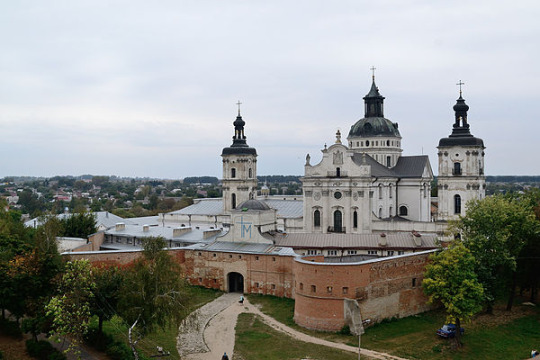
Бердичівський замок
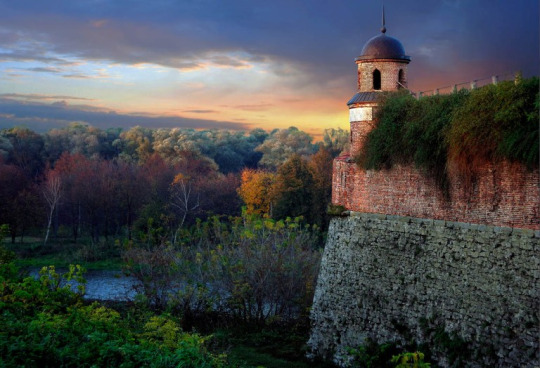
Дубенський замок
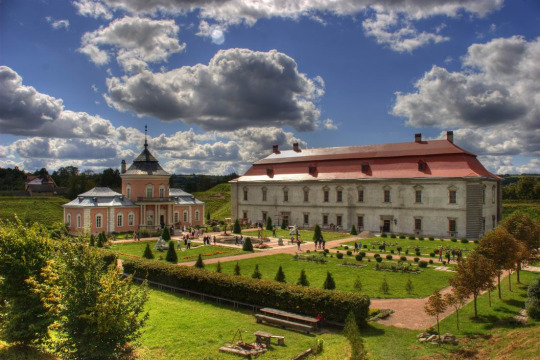
Золочівський замок
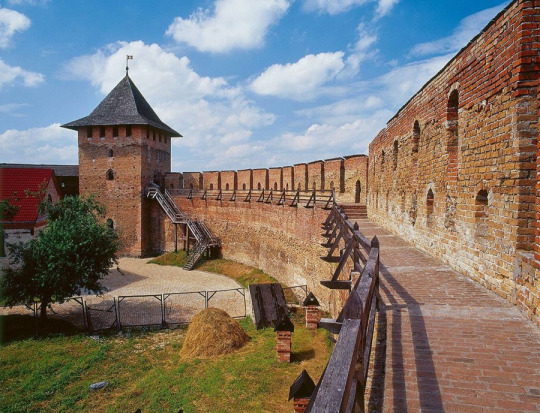
Замок Любарта
Vocabulary:
Замок - zamok - castle
Королівський замок - koroleevskyi zamok - royal castle
Королівська сім'я - koroleevska seemia - royal family
Принц - prynts - prince
Принцеса - pryntsessa - princess
Король - korol - king
Королева - koroleva - queen
#ukrainian language#ukrainian#ukrainian101#ukrainian lesson#learning languages#language learning#ua lang#ukraine#langblr#slavic languages#learnsomethingneweveryday#learning#self studying#polyglot#Language blog#foreign languages#learnukrainian#learn ukrainian#ukrainian culture#Ukrainian castles#royal vocabulary
59 notes
·
View notes
Text
I just love how PL ó, CZ ů, and SK ô developed from the exact same phoneme [o:], at around the same time and in almost the exact same way (becoming [uo] for some time) but they're still somehow used completely differently. What the hell
122 notes
·
View notes
Text
7. тоска
[tah-skah]
You might see тоска translated as “boredom” or “melancholy.” Some dictionaries equate it to “yearning.” It means all of this and more.
The word isn’t used that often in everyday life, but has been used in Russian literature to describe that “Загадочная русская душа” (“mysterious Russian soul”).
Take it from Владимир В. Набоков (Vladimir Nabokov), a great Russian writer, who described the word as such:
“At its deepest and most painful, it is a sensation of great spiritual anguish, often without any specific cause. At less morbid levels it is a dull ache of the soul, a longing with nothing to long for, a sick pining, a vague restlessness, mental throes, yearning. In particular cases it may be the desire for somebody or something specific, nostalgia, love-sickness. At the lowest level it grades into ennui, boredom…”
source: https://www.fluentu.com/blog/russian/untranslatable-russian-words/
#russian#russian language#slavic languages#linguistics#тоска#Загадочная русская душа#words#definitions#book 2
16 notes
·
View notes
Text
The lack of one simple word in english to differentiate jagody from borówki and wiśnie from czereśnie is so infuriating to me
#why i am getting so worked up over this#polish culture#polish language#english#language problems#poland#english language#slavic#slavic languages
168 notes
·
View notes
Text
Slavic languages are sexy change my mind
23 notes
·
View notes